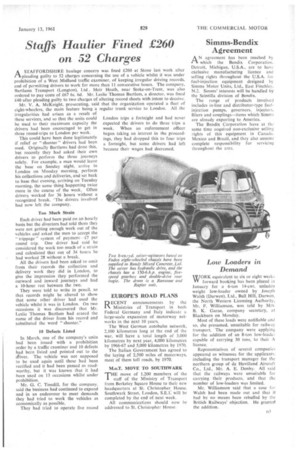Stafl's Haulier Fined £260 on 52 Charges
Page 61

If you've noticed an error in this article please click here to report it so we can fix it.
ASTAFFORDSHIRE haulage concern was fined £260 at Stone last week after leading guilty to 52 charges concerning the use of a vehicle whilst it was under prohibition of a West Midland traffic examiner, of keeping irregular driving records, and of permitting drivers to work for more than 11 consecutive hours. The company, Bartlams Transport (Longton), Ltd, Meir Heath, near Stoke-on-Trent, was also ordered to pay costs of £67 6s. 6d. Mr. Leslie Thomas Bartlam, a director, was fined £40 after pleading guilty to two charges of altering record sheets with intent to deceive.
This could have been done legitimately if relief or " shunter " drivers had been used. Originally Bartlams had done this, but recently they had asked their own drivers to perform the three journeys solely. For example, a man would leave the base on Sunday night, arrive in London on Monday morning, perform his collections and deliveries, and set back to base that evening, arriving on Tuesday morning, the same thing happening twice more in the course of the week. Often drivers worked for 36 hours without a recognized break. The drivers involved had now left the company.
Too Much Strain
Each driver had been paid on an hourly basis but the directors had told them they were not getting enough work out of the vehicles and asked the men to accept the " trippage " system of payment—£7 per round trip. One driver had said he considered the work too much of a strain and calculated that out of 34 hours he had worked 28 without a break.
All the drivers had been asked to omit from their records the collection and delivery work they did in London, to give the impression they performed the outward and inward journeys and had a 10-hour rest between the two.
They were told to write in pencil, so that records might be altered to show that some other driver had used the vehicle whilst it was in London. On two occasions it was discovered that Mr. Leslie Thomas Bartlam had erased the name of the driver from his record and substituted the word "shunter."
10 Defects Listed
In March, one of the company's units had been issued with a prohibition order by a traffic examiner and 10 defects had been listed and pointed out to the Aver. The vehicle was not supposed to be used again until these had been rectified and it had been passed as roadworthy, but it was known that it had been used on 13 occasions whilst under prohibition.
Mr. G. C. Tinsdill, for the company, said the business had continued to expand and in an endeavour to meet demands they had tried to work the vehicles as economically as possible.
They had tried to operate five round London trips a fortnight and had never expected the drivers to do three trips a week. When an enforcement officer began taking an interest in the proceedings, they had dropped this to four trips a fortnight, but some drivers had left because their wages had decreased.
EUROPE'S ROAD PLANS RECENT announcements by the Ministries of Transport in both Federal Germany and Italy indicate a large-scale expansion of motorway networks in the next 10 years.
The West German autobahn network, 2,100 kilometres long at the end of the war, will have a total length of 3,000 kilometres by next year, 4,000 kilometres by 1966-67 and 5,000 kilometres by 1970.
The Italian Government has agreed to the laying of 2,500 miles of motorways, most of them toll roads, by 1970.
M.o.T. MOVE TO SOUTHWARK
THE move of 1.200 members of the staff of the Ministry of Transport from Berkeley Square House to their new headquarters at St. Christopher House. Southwark Street, London, S.E.1; will be completed by the end of next week.
All communications should now be addressed to St. Christopher House.
Simms-Bendix Agreement
AN agreement has been reached by which the Bendix Corporation. Detroit, Michigan, U.S.A., are to have exclusive manufacturing licence and selling rights throughout the U.S.A. for fuel-injection equipment designed by Simms Motor Units, Ltd., East Finchley, N.2. Simms' interests will be handled by the Scintilla division of Bendix.
The range of products involved includes in-line and distributor-type fuelinjection pumps, governors, injectors. filters and couplings—items which Simms are already exporting to America.
The Bendix Corporation have at the same time acquired non-exclusive selling rights of this equipment in Canado. Mexico and Brazil, and they also assume complete responsibility for servicing throughout the area.
Low Loaders in Demand
WORK equivalent to six or eight week, forward booking has been placed in January for a 6-ton 14-cwt. unladen weight low-loader owned by Joseph Walsh (Darwen), Ltd., Bull Hill, Darwen, the North Western Licensing Authority, Mr. F. Williamson, was told by Mrs. B. K. Game, company secretary, at Blackburn on Monday.
Most of these loads were notifiable and so, she presumed, unsuitable for railway transport. The company were applying for the addition of an 8-ton low-loader capable of carrying 30 tons, to their A licence. .
Representatives of several companies appeared as witnesses for the applicants. including the transport manager for the northern group of de Havilland Aircraft Co., Ltd., Mr. A. E. Denby. All said that the railways were unsuitable for carrying their products, and that the number of low-loaders was limited.
Mr. Williamson said that a case fol. Walsh had been made out and that it had by no means been rebuffed by the British Railways' objection. He granted the addition.




















































































































































